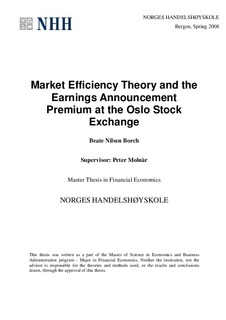| dc.description.abstract | Lamont and Frazzini (2007) document that a trading strategy consisting of buying every
stock expected to announce within the coming month and selling short every stock not
expected to announce the coming month generates a large and statistically significant
earnings announcement premium in the U.S. stock market between 1972 and 2004. Lamont
and Frazzini (2007) claim that the main explanation for the earnings announcement premium
is uninformed or irrational demand by individual investors, coupled with imperfect arbitrage
by sophisticated investors. Their results are not in accordance with weak-form market
efficiency in the U.S. stock market in the sense that historical information can be used to
predict future stock prices. This thesis will test if related trading strategies based on
predicted quarterly earnings announcement dates generates an earnings announcement
premium at the Oslo Stock Exchange in the period between 1999 and 2007.
Contrasting with the results of Lamont and Frazzini (2007) the results presented in this
thesis, that are not statistically significant, show that various versions of the trading strategy
based on predicted earnings announcement dates seem to generate negative monthly average
excess returns. Further, a L/S portfolio trading strategy based on actual announcement dates
does not generate average monthly returns statistically significantly larger than zero. This
indicates that improved methods for predicting earnings announcement dates would not
assist in forming L/S portfolios generating positive excess returns over the sample period.
Consequently, it seems there was no earnings announcement premium at the Oslo Stock
Exchange in the sample period between 1999 and 2007. The results presented in this thesis
can therefore not reject market efficiency at the Oslo Stock Exchange.
The main reasons for the presented results, which are differing from the results of Lamont
and Frazzini (2007), are the following: Firstly, there is a possibility that the dataset of
earnings announcement dates utilised in this analysis is not representative for the sample
period regarding the real coverage of earnings announcement dates. Moreover, there is a
possibility that the patterns found by Lamont and Frazzini (2007) are random, and caused by
for example data-mining, and that in reality there is no earnings announcement premium. | en |
